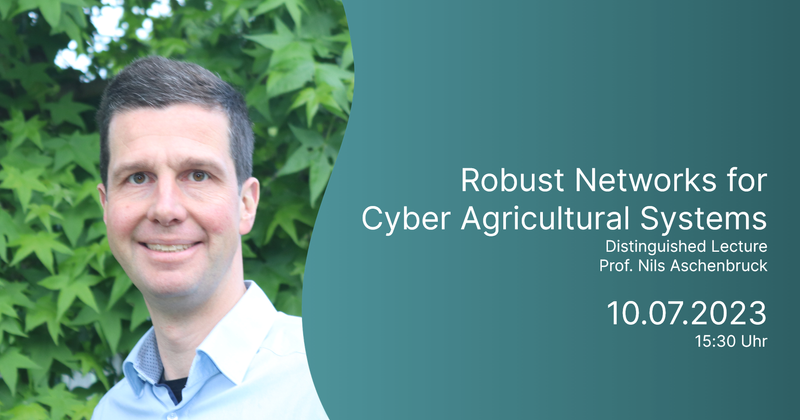Robust Networks for Cyber Agricultural Systems
Distinguished Lecture with Prof. Nils Aschenbruck
Distinguished Lecture with Prof. Nils Aschenbruck

In June there will be a second Distinguished Lecture. We are looking forward to Prof. Nils Aschenbruck from the University of Osnabrück and his lecture on “Robust Networks for Cyber Agricultural Systems”. smart farming using crop data is a promising way to increase efficiency in agriculture – but it requires robust and reliable networks. The lecture on Monday, July 10, at 3:30 p.m. at the TU Darmstadt will focus on the approaches available. The event is again organized by MAKI and emergenCITY. We wish you an exciting lecture:
Increasing the efficiency of farming has been one of (if not) the most important factor in human development since the neolithic age. It laid the path for mankind’s accomplishments in the present age. Even today, new improvements are required. One of the current, most promising improvements is precision farming which demands a spatial distribution of crop parameters in order to cultivate plants in every location in precisely the correct way, e.g., by supplying the perfect amount of fertilizer. At the horizon we even start seeing the next step: smart farming towards so-called Cyber Agricultural Systems. One of the core challenges for the next step is robust and reliable networks. In this talk, I will present approaches and results from field deployments, as well as point out challenges for future research towards resilient networks for Cyber Agricultural Systems.
Nils Aschenbruck is a Professor for Computer Science at Osnabrück University, Germany. His research interests include cyber physical systems, computer networks, network security, and scenario modeling. Nils Aschenbruck received his graduate diploma and PhD in computer science from Bonn University, Germany, in 2003 and 2008, respectively. He continued as a senior researcher and head of the research area “tactical wireless multi-hop networks” at the communication systems group of Bonn University, Germany. In spring 2010, he worked at the Colorado School of Mines, USA for a term, co-funded by the DAAD short term lectureship program. Since 2012 he holds a full professorship for distributed systems at Osnabrueck University. Since 2017 he serves as department head of the Computer Science department, member of the dean’s council, as well as the University senate.